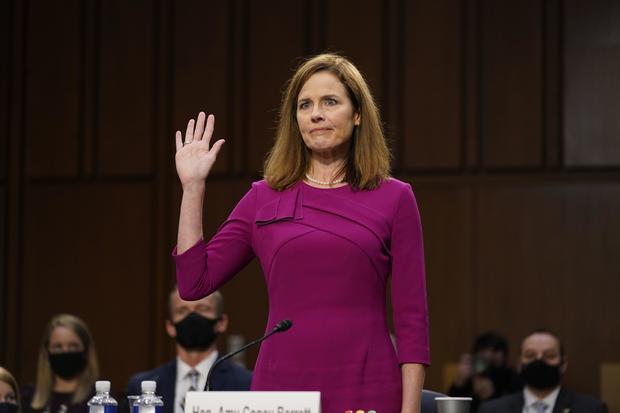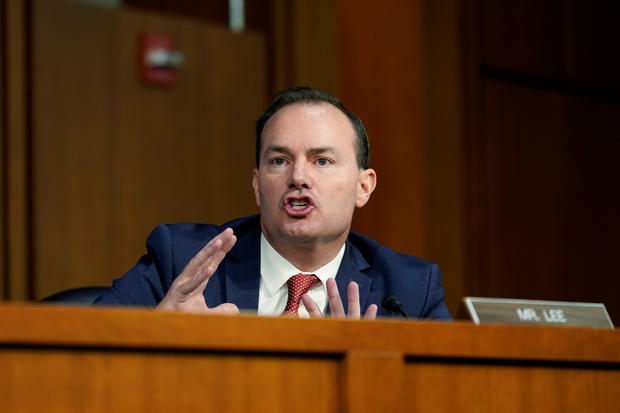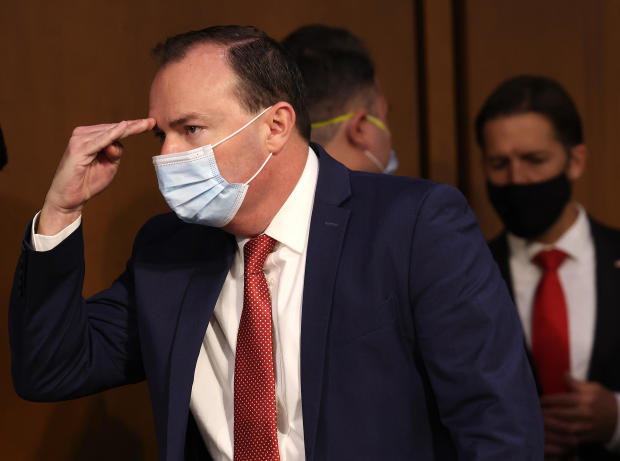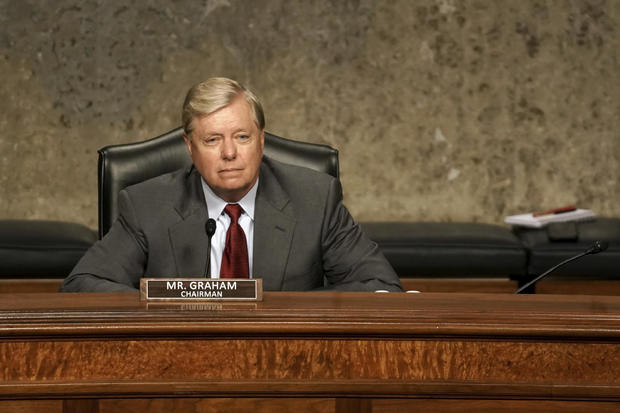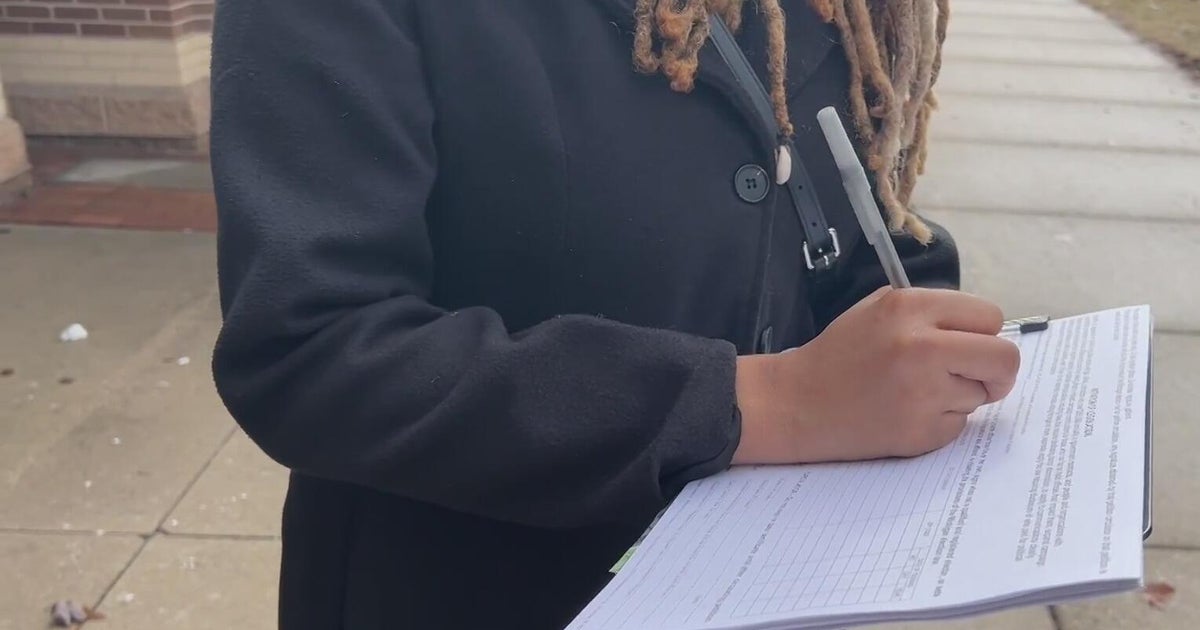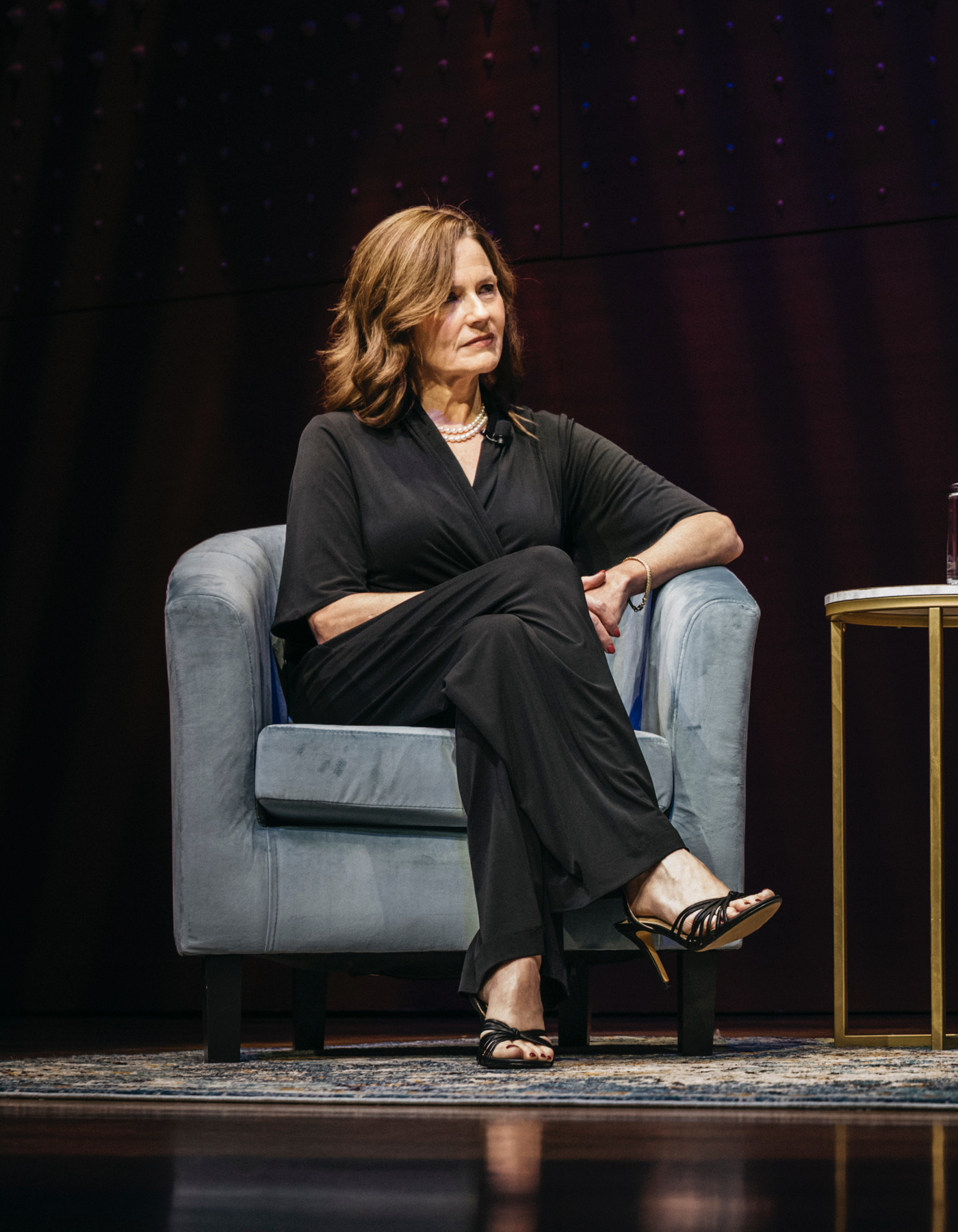No questions for Amy Coney Barrett on 1st day of Supreme Court confirmation hearings
Washington — Judge Amy Coney Barrett vowed to fulfill her duties "faithfully and impartially" if she is confirmed to the Supreme Court, appearing before the Senate Judiciary Committee on Monday for the first of four days of confirmation hearings as Republicans move to install her on the high court before November's election.
"Courts have a vital responsibility to enforce the rule of law, which is critical to a free society. But courts are not designed to solve every problem or right every wrong in our public life," Barrett said in her opening statement. "The policy decisions and value judgments of government must be made by the political branches elected by and accountable to the people. The public should not expect courts to do so, and courts should not try."
Barrett took no questions on the first day of hearings, which was instead dominated by opening statements by the 22 members of the committee. Democrats and Republicans spent the morning and early afternoon trading accusations and arguments about Barrett's ideological views, and the propriety of confirming her just weeks before the election.
The ongoing pandemic loomed over the proceedings, especially given a recent coronavirus outbreak among GOP senators who attended a White House event that is linked to dozens of infections. Several lawmakers, including vice presidential nominee Kamala Harris and Republican Thom Tillis, who recently tested positive, appeared remotely to deliver their opening statements.
Barrett, who would be the third Supreme Court justice nominated by President Trump, sat stoically for hours as the senators on the committee were each given 10 minutes to make remarks.
Republicans defended their decision to move forward with Barrett's nomination and pursue a vote to confirm her before the election. Senator Lindsey Graham, the committee's chairman, said the Senate "is doing its duty constitutionally." The GOP lawmakers also defended Barrett, who is Catholic, from perceived attacks on her faith, insisting her religious beliefs should be off limits, although no Democrats mentioned her faith in Monday's hearing.
Democrats, meanwhile, painted Barrett's nomination as Republicans' latest attempt to overturn the Affordable Care Act, or Obamacare. The Supreme Court is set to hear a case that could strike down the law one week after the November election, and Democrats highlighted Barrett's past criticism of Supreme Court rulings upholding the law to portray her nomination as a threat to the health care of millions of Americans.
The hearings will resume Tuesday, when senators will begin two rounds of questioning that will stretch into Wednesday. Outside witnesses will testify in support or opposition of Barrett's nomination on Thursday.
Key moments from Monday's hearing
- Graham kicks off first day of confirmation hearing
- Feinstein zeroes in on health care in opening statement
- Republicans invoke Kavanaugh confirmation battle in opening statements
- Hawley defends Barrett's Catholic faith
- Hirono invokes personal story to drive home focus on Obamacare
- Kamala Harris slams Republicans for holding "reckless" hearing
- Kennedy warns Barrett's hearings can "turn sour really fast," references Kavanaugh "freak show"
Barrett is sworn in, vowing to serve "faithfully and impartially"
After silently listening to senators for nearly five hours, Barrett stood and raised her right hand to be sworn in, and was given her first chance to speak.
She emphasized the importance of her family, thanking her husband, children and siblings who were in attendance. She said her youngest son, who has Down Syndrome, was not attending the hearing but at home with friends.
Barrett talked about how she was influenced by Justice Antonin Scalia, for whom she clerked early in her career.
"Justice Scalia taught me more than just law. He was devoted to his family, resolute in his beliefs, and fearless of criticism. And as I embarked on my own legal career, I resolved to maintain that same perspective," Barrett said. "There is a tendency in our profession to treat the practice of law as all-consuming, while losing sight of everything else. But that makes for a shallow and unfulfilling life."
Barrett said she "never let the law define my identity or crowd out the rest of my life." She said that a "similar principle" applied to the courts.
"Courts have a vital responsibility to enforce the rule of law, which is critical to a free society. But courts are not designed to solve every problem or right every wrong in our public life," Barrett said. "The policy decisions and value judgments of government must be made by the political branches elected by and accountable to the people. The public should not expect courts to do so, and courts should not try."
She said that in every case she has ruled on in her three years as a federal judge, she has "done my utmost to reach the result required by the law, whatever my own preferences might be."
"When I write an opinion resolving a case, I read every word from the perspective of the losing party," Barrett said. "I ask myself, how would I view the decision if one of my children was the party I was ruling against? Even though I would not like the result, would I understand that the decision was fairly reasoned and grounded in the law? That is the standard I set for myself in every case, and it is the standard I will follow as long as I am a judge on any court."
Barrett said that she came before the Senate "with appreciation for those who came before me," referencing Justices Sandra Day O'Connor and Ruth Bader Ginsburg, whose seat she would fill.
"I have been nominated to fill Justice Ginsburg's seat, but no one will ever take her place. I will be forever grateful for the path she marked and the life she led," Barrett said.
Barrett ended her statement by promising to "faithfully and impartially discharge my duties to the American people as an associate justice of the Supreme Court."
Barrett introduced by Indiana's 2 senators, Notre Dame professor
Indiana's two GOP senators, Todd Young and Mike Braun, appeared remotely to introduce Barrett before she was officially sworn in. Patricia O'Hara, professor emerita of law at Notre Dame Law School, was also supposed to introduce Barrett, but ran into technical difficulties. She instead spoke following Barrett's opening statement.
Young called Barrett an "American original" and said that wherever she has done, "she's always been doing something important."
"It's my hope that this body will confirm Judge Barrett in a bipartisan fashion," he said.
Braun, meanwhile, said that when confirmed, Barrett will become the only Supreme Court justice to have spent the majority of her life in middle America, and the only sitting justice not to receive her law degree from Harvard or Yale.
Braun described Barrett as a "legal titan who drives a minivan" and will make "all Americans proud."
O'Hara, a former dean of Notre Dame Law School, recounted watching Barrett's career develop over the 15 years in South Bend and said students hold her in "awe of her intellect."
"In many ways, Judge Barrett sprang full-grown into the legal academy," she said.
Kennedy warns Barrett's hearings can "turn sour really fast," references Kavanaugh "freak show"
Senator John Kennedy, a Republican from Louisiana, painted a colorful picture for how Barrett's confirmation hearing could take a turn for the worse, recalling the chaos that engulfed Kavanaugh's confirmation hearings in 2018.
"Now look, judge, I'm not naive," he said. "I understand this thing can turn sour real fast. We all watched the hearings for Justice Kavanaugh. It was a freak show."
Kennedy described Kavanaugh's confirmation hearings as the "cantina bar scene out of Star Wars."
The Louisiana Republican also said it must be difficult for a person of deep faith, as Barrett is, to be "called a religious bigot."
In opening statement, Harris slams Republicans for holding "reckless" hearing
After a brief technical hiccup, Democratic vice presidential nominee Kamala Harris appeared virtually, and slammed chairman Lindsey Graham for choosing to hold the hearings this week when the rest of the Senate had postponed business because of the recent positive diagnoses of senators.
"This committee has ignored commonsense requests to keep people safe — including not requiring testing for all members — despite a coronavirus outbreak among senators of this very committee," Harris said. "The decision to hold this hearing now is reckless and places facilities workers, janitorial staff, congressional aides, and Capitol Police at risk."
Harris, the Democratic vice presidential nominee, also noted that early voting is currently ongoing, and that Election Day is only weeks away. Like the other Democrats on the committee, Harris raised concerns that Barrett would vote to overturn the Affordable Care Act as a member of the court.
"They are trying to get a justice onto the Court in time to ensure they can strip away the protections in the Affordable Care Act," Harris said. "Mr. Chairman, this hearing is a clear attempt to jam through a Supreme Court nominee who will take health care away from millions of people during a deadly pandemic that has already killed more than 214,000 Americans."
Hirono invokes personal story to drive home focus on Obamacare
Senator Mazie Hirono, a Democrat from Hawaii, continued to raise concerns about the future of the Affordable Care Act if Barrett is confirmed to the Supreme Court, and said that for her, health care is "personal."
She recalled being diagnosed with stage 4 kidney cancer several years ago, saying, "I know that having health insurance and access to health care saved my life."
Hirono said she still has cancer but no longer receives treatment. She also thanked Graham for consistently checking in on her, and made an appeal directly to him.
"At moments like this, where the health care of millions is on the line, I think back to the care and concern so many of you showed me when I was diagnosed with cancer three and a half years ago. So many of you, including many of my Republican colleagues on this committee, wrote heartfelt notes wishing me well and letting me know you were thinking of me. And to this day, when the chairman of this committee and I find ourselves away from the camera or sharing an elevator, he never hesitates to ask me about my health. He says, 'How are you doing?'" Hirono said.
"Moments where we recognize our shared humanity are rare in Congress these days but this can and should be one of those moments," she continued.
Graham could be seen smiling and nodding as Hirono spoke.
"I think it's not just me. I think everybody on this committee, everybody who knows you knows you're passionate about your causes," he said. "We have a lot of political differences but all of us are very encouraged to hear you're doing well and we'll keep praying for you."
Hirono replied, "I appreciate that. Thank you. Do the right thing."
Meadows declines to keep mask on while talking to reporters
White House chief of staff Mark Meadows, who attended the first few hours of the hearing, declined to address reporters while wearing a mask during a break. When Meadows walked over to speak to a group of reporters in the hallway of the Hart Senate Office Building, one reporter asked him to keep his mask on while he spoke. Meadows said that he was standing 10 feet away from reporters.
"I'm not going to talk through a mask," Meadows said, before walking away. Public health experts have recommended that people wear masks when in public and particularly in an indoor setting.
Committee reconvenes for remainder of opening statements
Graham reconvened the committee right at 12:20 p.m., notably before Barrett had taken her seat back before the committee.
Democratic Senator Mazie Hirono of Hawaii is kicking off what will be the remaining opening statements for senators. White House chief of staff Mark Meadows does not appear to be in attendance.
Hearing recesses for lunch, with 7 senators still to speak
Graham recessed the committee for a break at 11:37 p.m. They are expected to return at 12:20 p.m.
Still to deliver their opening statements are Hirono, Booker and Harris on the Democratic side, and Ernst, Crapo, Kennedy and Blackburn on the GOP side.
Before the break, Senator Josh Hawley, a Republican from Missouri, lambasted Democrats for questioning Barrett during her confirmation hearing as a nominee to the 7th Circuit about her Catholic faith and called out Harris by name for questioning other nominees about their membership in Catholic organizations like the Knights of Columbus.
"When you tell somebody that they're too Catholic to be on the bench, when you tell them they'll be a Catholic judge, not an American judge, that's bigotry," he said. "The pattern and practice of bigotry from members of this committee must stop, and I would expect that it be renounced."
Senator Richard Blumenthal, a Democrat from Connecticut, delivered a searing indictment of originalism, the judicial philosophy Barrett ascribes to, calling it a "smokescreen" that allows conservative judges to "legislate from the bench and strike down" popular laws Republicans can't repeal through the legislative process. Blumenthal closed by calling on Barrett to recuse herself from election-related disputes.
"Your participation in any case involving Donald Trump's election would immediately do explosive, enduring harm to the court's legitimacy and to your own credibility. You must recuse yourself," he said.
Closing out the morning session was Senator Thom Tillis, who tested positive for COVID-19 after the September 26 Rose Garden event. Tillis appeared remotely.
He revealed that while meeting with Barrett in the Capitol, she signed pocket Constitution for his two granddaughters and wrote "dream big."
Biden says Barrett should not be questioned about her faith
Speaking to reporters on the tarmac before leaving Delaware for a campaign event in Ohio, Biden said Barrett's faith should not be considered during her confirmation process and should not be a focus of any questions by lawmakers.
"No one's faith should be questioned," he said. "Let's keep our eye on the ball. This is about whether or not in one month Americans are going to lose their health insurance."
Mike Lee delivers opening statement without wearing a mask
Republican Senator Mike Lee of Utah, who attended the September 26 celebration in the Rose Garden for Barrett that is linked to several dozen COVID-19 cases, was not wearing a mask when he delivered his opening statement.
The Utah senator tested positive for COVID-19 on October 2 and is participating in the hearing in person. Lee put his mask back on after he delivered his statement.
After making his statement, Lee released a letter from the attending physician of the Senate, who wrote to Lee that he has "met criteria to end COVID-19 isolation for those with mild to moderate disease."
"Specifically, it has been greater than 10 days since symptom onset, you have had no fever in absence of fever reducing medication for at least 24 hours, and your other symptoms have improved," Dr. Brian Monahan wrote. "The CDC does not recommend repeat SARS-CoV-2 PCR testing if these criteria are met."
The Centers for Disease Control and Prevention states a person with mild to moderate coronavirus symptoms may be infectious for up to 10 days after the onset of symptoms. A small fraction of patients with severe cases may be contagious for up to 20 days.
Monahan, the Senate doctor, wrote that Lee's symptoms began 12 days ago, and he last had a fever on October 8. Lee reported "some remaining but improving fatigue," with all other symptoms "resolved" as of Sunday, Monahan wrote.
Trump urges Republicans to "pull back" on confirmation hearings
President Trump on Monday urged Republicans to "pull back" on confirmation hearings for Barrett and focus instead on passing a coronavirus stimulus bill, directly contradicting his words from less than a week ago when he told Senate Majority Leader Mitch McConnell to "focus full time on approving my outstanding nominee to the United States Supreme Court, Amy Coney Barrett."
"The Republicans are giving the Democrats a great deal of time, which is not mandated, to make their self serving statements relative to our great new future Supreme Court Justice. Personally, I would pull back, approve, and go for STIMULUS for the people!!!" Mr. Trump wrote on Twitter.
The Judiciary Committee must approve Barrett before her nomination can go to the Senate floor for a full vote. Republicans and Democrats are given equal time to make statements and question Barrett as part of confirmation hearings.
Republicans invoke Kavanaugh confirmation battle in opening statements
As members of the committee delivered their opening remarks, several Republicans raised Justice Brett Kavanaugh's bruising confirmation battle in 2018, which was roiled by accusations of sexual misconduct against the justice.
Kavanaugh emphatically denied the allegations, and the Senate Judiciary Committee held a hearing to further explore accusations made by Dr. Christine Blasey Ford, who claimed Kavanaugh sexually assaulted her during a small party in the early 1980s.
"Democrats and their leftist allies have also shown that there is no low that they won't stoop to in their crusade to tarnish a nominee, and I saw it all as chairman of this committee when Kavanaugh came up," said Senator Chuck Grassley of Iowa, who helmed the committee at the time. Kavanaugh's nomination was ultimately approved.
Invoking the Kavanaugh hearings, Senator John Cornyn of Texas called treatment of the justice an "absolute disgrace" and hopefully a "low point" for the Senate.
Feinstein zeroes in on health care in opening statement
In her opening statement, Senator Dianne Feinstein, the top Democrat on the committee, questioned whether Barrett would vote to overturn the Affordable Care Act if confirmed to the Supreme Court. The court is set to hear arguments on a case on the constitutionality of the law on November 10.
"The president has promised to appoint justices who will vote to dismantle that law," Feinstein said, noting that Barrett has criticized Chief Justice John Roberts' majority opinion in a 2012 ruling upholding the law.
"The bottom line is this: there have been 70 attempts to repeal the ACA, but clearly the effort to dismantle the law continues," Feinstein said. Congress unsuccessfully attempted to repeal the bill, without a clear alternative, in 2017.
Feinstein also described stories of Americans who have benefited from the law, including a constituent of hers in California. Democrats have placed photographs of people who have benefited from the Affordable Care Act around the hearing room.
Democrats have rankled at what they see as hypocrisy from Republicans in pushing to move forward with Barrett's nomination so close to the election. Feinstein noted that Election Day was 22 days away, and voting had begun in 40 states.
She also recalled when Justice Antonin Scalia died in February 2016, and Senate Republicans blocked the confirmation of Judge Merrick Garland, President Obama's nominee to fill the seat. She threw Graham's words back at him, quoting his comments in 2018 when he said he would not fill a Supreme Court vacancy in an election year.
"Simply put, I believe we should not be moving forward on this nomination," Feinstein said.
Democrats are expected to follow this dual track in questioning Barrett: probing her opinions on the Affordable Care Act, and arguing that the very confirmation process is illegitimate.
Graham kicks off first day of confirmation hearing
Just after 9 a.m., Graham opened the first day of Barrett's confirmation hearing, noting that the committee room has been set up in consultation with the architect of the Capitol and the attending physician to allow for lawmakers to "safely do our business."
The "COVID problem in America it's real, it's serious, it's dangerous," Graham said.
In attendance is Senator Mike Lee, who tested positive for COVID-19 after attending the Rose Garden ceremony where Barrett was announced as Mr. Trump's nominee last month.
In his opening statement, Graham honored the late Justice Ruth Bader Ginsburg, whose seat Barrett will fill if confirmed by the Senate, and noted her nomination was approved with overwhelming bipartisan support, 96-3.
Turning to Barrett, Graham said she is in a "category of excellence."
"This is an election year. We're confirming the judge in an election year after the voting has occurred," Graham said. "What will happen is that my Democratic colleagues will say this has never been done, and they're right in this regard: no one has ever been confirmed in an election year past July."
But the South Carolina senator said there is "nothing unconstitutional about this sprocess."
"The Senate is doing its duty constitutionally," he said.
Mike Lee attending hearing despite COVID-19 diagnosis
GOP Senator Mike Lee, who tested positive for the coronavirus less than two weeks ago, is attending today's confirmation hearing in person. Lee was diagnosed after attending the nomination ceremony for Barrett, which has since been described as Dr. Anthony Fauci as a "super-spreader" event.
Lee told reporters that he felt "great," but did not say whether he had been tested before Monday's hearing. Lee is wearing a mask.
American Bar Association rates Barrett as "well qualified" to serve on Supreme Court
The American Bar Association's Standing Committee on the Federal Judiciary determined Barrett is "well qualified" to serve on the Supreme Court.
Randall Noel, chair of the committee, wrote in a letter to Graham and Feinstein dated Sunday that a "substantial majority" of the Standing Committee rated Barrett as "well qualified," while a minority determined she is "qualified."
The American Bar Association's standing committee evaluates a nominee's professional qualifications, focusing on "the qualities of integrity, professional competence and judicial temperament."
Senators to watch in Barrett's confirmation hearings
There are 22 members on the Republican-controlled Judiciary Committee — 12 Republicans and 10 Democrats — and each will have their chance to question Barrett directly beginning on Tuesday. Each senator will have 10 minutes to make opening statements on Monday, with questioning alternating between Republicans and Democrats. Here are all the senators on the Judiciary Committee, in order of seniority:
- Chairman Lindsey Graham, Republican
- Ranking Member Dianne Feinstein, Democrat
- Chuck Grassley, Republican
- Patrick Leahy, Democrat
- John Cornyn, Republican
- Dick Durbin, Democrat
- Mike Lee, Republican
- Sheldon Whitehouse, Democrat
- Ted Cruz, Republican
- Amy Klobuchar, Democrat
- Ben Sasse, Republican
- Chris Coons, Democrat
- Josh Hawley, Republican
- Richard Blumenthal, Democrat
- Thom Tillis, Republican
- Mazie Hirono, Democrat
- Joni Ernst, Republican
- Cory Booker, Democrat
- Mike Crapo, Republican
- Kamala Harris, Democrat
- John Kennedy, Republican
- Marsha Blackburn, Republican
Some members of the committee are in tough reelection fights: Chairman Lindsey Graham of South Carolina, and Republicans Joni Ernst of Iowa and Thom Tillis of North Carolina. Graham's Democratic opponent Jaime Harrison raised an eye-popping $57 million in the third quarter, the largest ever haul for a Senate candidate.
Eyes will also be on Senator Kamala Harris of California, the Democratic vice presidential nominee. A former prosecutor, Harris garnered attention for her questioning of Justice Brett Kavanaugh during his contentious confirmation hearings in 2018.
She is expected to participate in the hearings remotely from her Senate office, her office said, citing "Judiciary Committee Republicans' refusal to take commonsense steps to protect members, aides, Capitol complex workers and members of the media."
Grace Segers and Melissa Quinn
Barrett releases opening statement
Barrett released her opening statement on Sunday. She will say that in every case she has ruled on in her three years as a federal judge, she has "done my utmost to reach the result required by the law, whatever my own preferences might be."
"When I write an opinion resolving a case, I read every word from the perspective of the losing party," Barrett will say. "I ask myself how would I view the decision if one of my children was the party I was ruling against: Even though I would not like the result, would I understand that the decision was fairly reasoned and grounded in the law? That is the standard I set for myself in every case, and it is the standard I will follow as long as I am a judge on any court."
How to watch Amy Coney Barrett's Senate hearings
What: Senate Judiciary hearings on the nomination of Amy Coney Barrett to the Supreme Court
Date: Monday, October 12 to Thursday, October 15
Time: 9 a.m. ET
CBSN coverage: Preshow coverage begins at 8:30 a.m. ET
Location: Capitol Hill
Online stream: Live on CBSN — in the player above and on your mobile or streaming device
